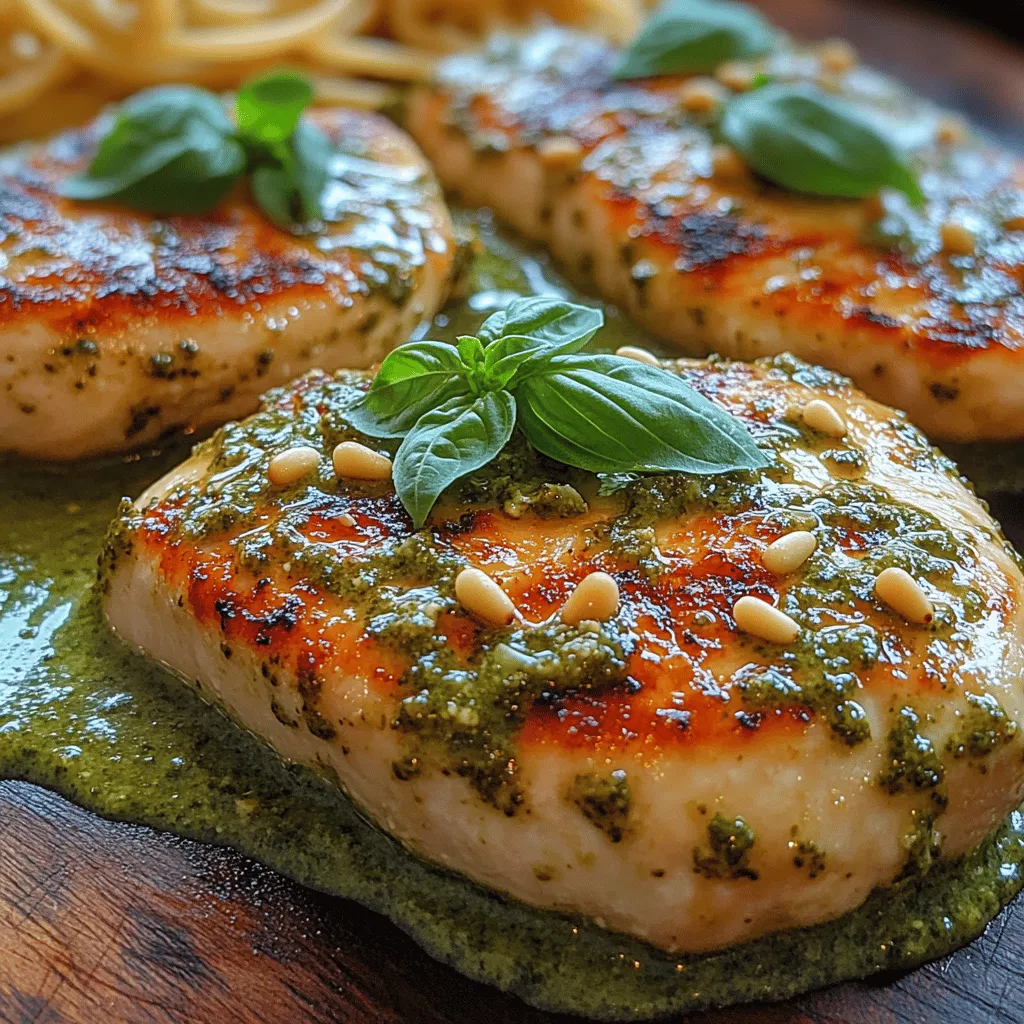Creamy Basil Pesto Chicken: A Delightful Meal Option
If you’re searching for a dish that combines simplicity with gourmet flair, look no further than Creamy Basil Pesto Chicken. This delightful recipe encapsulates the essence of Italian cuisine, merging tender chicken with a rich, creamy pesto that tantalizes the taste buds. Perfect for weeknight dinners or special occasions, this dish showcases the versatility of chicken while celebrating the vibrant flavors of fresh ingredients.
A Brief Background on Pesto
The origins of pesto date back to Genoa, Italy, where the traditional sauce was crafted using a mortar and pestle—hence the name “pesto,” derived from the Italian word “pestare,” meaning “to pound.” Originally made from fresh basil, garlic, pine nuts, Parmesan cheese, and olive oil, pesto has evolved into a beloved culinary staple that transcends borders and inspires countless variations. From sun-dried tomato and arugula pestos to vegan adaptations, the core concept remains the same: a blend of fresh ingredients that enhances the flavor of any dish.
Importance of Fresh Ingredients
When it comes to preparing Creamy Basil Pesto Chicken, the quality of your ingredients significantly impacts the overall flavor. Fresh basil, vibrant garlic, and high-quality olive oil are essential, as they contribute not only to the taste but also to the dish’s aroma and visual appeal. Using fresh ingredients allows home cooks to elevate their meals, creating a dining experience that is both satisfying and memorable.
The Appeal of the Dish
Creamy Basil Pesto Chicken is a perfect representation of a dish that is both indulgent and simple to prepare. The creamy sauce envelops the chicken, creating a rich texture that pairs beautifully with pasta, rice, or even a fresh salad. This recipe is particularly appealing for home cooks who want to impress without spending hours in the kitchen. With just a few steps, you can create a restaurant-quality meal that your family and friends will rave about.
Understanding Pesto: A Culinary Staple
Before diving into the specifics of Creamy Basil Pesto Chicken, it’s essential to understand pesto itself—a culinary staple that can elevate a variety of dishes. Pesto is traditionally made with a handful of ingredients, including fresh basil, garlic, pine nuts, Parmesan cheese, and olive oil. This harmonious blend not only packs a flavor punch but also offers nutritional benefits. Basil, for instance, is rich in antioxidants and anti-inflammatory properties, making it a powerhouse herb in any kitchen.
Common Ingredients and Variations
While traditional pesto is beloved, countless variations exist, allowing home cooks to experiment with different flavors and textures. For example, swapping out basil for arugula adds a peppery kick, while using walnuts instead of pine nuts can introduce a deeper, earthier note. Each variation can lend a unique twist to the dish, ensuring there’s something for everyone.
Nutritional Benefits of Pesto Ingredients
Pesto’s primary ingredient, basil, is not only flavorful but also packed with nutrients. It contains vitamins A, C, and K, along with essential oils that provide numerous health benefits. Garlic, another key player in pesto, is renowned for its immune-boosting properties and heart health benefits. The addition of nuts, cheese, and olive oil brings healthy fats and protein into the mix, making pesto a nutritious addition to your meals.
The Star Ingredient: Chicken Breasts
When preparing Creamy Basil Pesto Chicken, the star ingredient is undoubtedly the chicken. Boneless, skinless chicken breasts are favored for their lean protein content and quick cooking time. A good source of essential nutrients, chicken is versatile and can adapt to various flavor profiles, making it an ideal canvas for the creamy pesto sauce.
Nutritional Profile of Chicken Breasts
Chicken breasts are an excellent source of protein, containing about 31 grams of protein per 100 grams. They are low in fat and calories, making them a popular choice for those looking to maintain a healthy diet. Additionally, chicken is rich in B vitamins, particularly niacin and vitamin B6, which are essential for energy metabolism and overall health.
Benefits of Using Chicken in Recipes
Not only is chicken a nutritious option, but it also cooks quickly, making it perfect for busy weeknights. Whether you’re grilling, baking, or sautéing, chicken breasts can be ready in under 30 minutes, allowing you to whip up a delicious meal in no time. Their mild flavor allows them to pair well with a variety of sauces and marinades, making them a staple in kitchens around the world.
Tips for Selecting the Best Quality Chicken
When shopping for chicken, look for boneless, skinless breasts that are plump and have a pale pink color. Avoid any pieces that appear discolored or have an unpleasant smell. If possible, opt for organic or free-range chicken, as these options often have better flavor and texture compared to conventional varieties.
Ingredients Breakdown
As we prepare to create Creamy Basil Pesto Chicken, let’s take a closer look at the key ingredients that make this dish irresistible.
Fresh Basil Leaves
At the heart of this recipe is fresh basil, which provides a vibrant flavor and aroma. Not only does basil enhance the dish’s taste, but it also offers numerous health benefits, including anti-inflammatory and antibacterial properties.
Pine Nuts
Pine nuts contribute a creamy texture and a subtle nuttiness to the pesto. Rich in healthy fats and protein, they also provide essential vitamins and minerals, including magnesium and zinc.
Garlic
Garlic is a flavor powerhouse and plays a crucial role in enhancing the overall taste of the pesto. Beyond its culinary benefits, garlic is known for its health properties, including immune-boosting effects.
Parmesan Cheese
Parmesan cheese adds depth and creaminess to the pesto. Different types of Parmesan can be used, but freshly grated cheese is always recommended to achieve the best flavor.
Heavy Cream
Heavy cream is what transforms the traditional pesto into a rich, creamy sauce that clings to the chicken. It adds a luxurious mouthfeel that elevates the dish to new heights.
Olive Oil
Quality olive oil is essential in creating a smooth and flavorful pesto. When selecting olive oil, look for extra virgin options that are cold-pressed for the best taste and health benefits.
Seasoning Elements
Finally, seasoning is key to bringing all the flavors together. Salt, pepper, lemon juice, and red pepper flakes enhance the overall taste and balance the creaminess of the sauce.
Step-by-Step Preparation for Creamy Basil Pesto Chicken
Now that we’ve covered the ingredients, let’s delve into the preparation of Creamy Basil Pesto Chicken. The following steps will guide you through the process of creating this delicious dish, ensuring that every bite is packed with flavor.
Stay tuned for the next section, where we will break down the step-by-step preparation, making it easy for you to recreate this delightful meal in your own kitchen.

Comprehensive Guide to Making the Pesto
Creating a delicious basil pesto is the heart of this Creamy Basil Pesto Chicken recipe. A homemade pesto not only elevates the flavor profile of your dish but also allows you to control the freshness and quality of the ingredients.
Detailed Instructions on Using a Food Processor for Best Results
To make the perfect basil pesto, a food processor is your best friend. Here’s how to achieve a silky-smooth consistency:
1. Gather Ingredients: You will need fresh basil leaves, garlic cloves, pine nuts (or walnuts for a twist), Parmesan cheese, olive oil, and salt.
2. Add the Basil and Nuts: Start by adding about 2 cups of fresh basil leaves into the food processor, followed by a quarter cup of nuts. Pulse these together until they are finely chopped.
3. Incorporate Garlic and Cheese: Next, add 2-3 garlic cloves (depending on how garlicky you like it) and a half cup of grated Parmesan cheese. Pulse again until combined.
4. Drizzle in Olive Oil: With the processor running, slowly drizzle in about half a cup of high-quality extra virgin olive oil. This method emulsifies the oil with the other ingredients, creating a creamy texture.
5. Season to Taste: Finally, add salt to taste. You may want to adjust the seasoning based on your preference—don’t hesitate to taste and tweak the flavors!
Tips for Achieving the Right Consistency and Flavor Balance
– Consistency: For a thicker pesto, use less olive oil; for a more spreadable consistency, add more. A great pesto should be creamy but still have a bit of texture.
– Flavor Balance: The key to a great pesto is balance. If your pesto tastes too sharp, consider adding more oil or a pinch of sugar to mellow the flavors. Conversely, if it’s too rich, a squeeze of lemon juice can brighten it up.
– Storage: If you’re not using the pesto immediately, store it in an airtight container with a layer of olive oil on top to prevent oxidation.
Preparing the Chicken: Seasoning and Cooking Techniques
Now that your pesto is ready, let’s turn our attention to the chicken.
Importance of Seasoning and the Role of Red Pepper Flakes
Proper seasoning is essential for flavor development. Start by patting the chicken breasts dry with paper towels and then season them generously with salt and black pepper. For a little kick, sprinkle red pepper flakes on both sides of the chicken. This adds a subtle heat that beautifully complements the creaminess of the pesto.
Cooking Methods: Skillet vs. Grilling and Their Impact on Texture
You can prepare the chicken using various methods, each offering a unique texture:
1. Skillet Cooking: This method allows for a golden-brown crust while remaining juicy inside. Heat a couple of tablespoons of olive oil in a skillet over medium-high heat. Add the seasoned chicken breasts and cook for about 6-7 minutes per side, depending on thickness, until they reach an internal temperature of 165°F (75°C).
2. Grilling: If you prefer a smoky flavor, grill the chicken over medium heat. This method also imparts beautiful grill marks and a slightly charred flavor. Grill each side for about 6-8 minutes, keeping an eye on the internal temperature.
Combining Chicken and Pesto: Techniques for a Seamless Finish
Once the chicken is cooked, it’s time to incorporate the pesto. Remove the chicken from the skillet or grill and let it rest for a few minutes. This resting period allows the juices to redistribute, ensuring moist chicken.
To combine, slice the chicken into strips or leave it whole, then generously spoon the creamy basil pesto over the top. Ensure that each piece is well coated for maximum flavor. Serve immediately for the best experience.
Serving Suggestions and Pairings
To elevate your Creamy Basil Pesto Chicken into a complete meal, consider these side dish options:
Ideas for Side Dishes That Complement Creamy Basil Pesto Chicken
– Roasted Vegetables: Seasonal vegetables like zucchini, bell peppers, and cherry tomatoes tossed in olive oil and roasted until caramelized make a beautiful side dish.
– Garlic Bread: A classic pairing, garlic bread can soak up any extra pesto sauce.
Pasta Options: Types of Pasta That Work Well
Pasta is a classic companion to pesto, so consider these options:
– Fusilli: The spiral shape holds onto the pesto beautifully.
– Penne: The tubular shape allows the pesto to cling to the inside.
– Spaghetti: A long-time favorite, especially when served with a drizzle of olive oil.
Rice and Grain Suggestions: Flavor Pairings and Preparation Methods
– Quinoa: This protein-packed grain complements the chicken well and can be served warm or cold.
– Brown Rice: A nutty flavor that pairs excellently with the creamy pesto.
Fresh Salads: How to Create a Light, Refreshing Contrast
A light salad can provide a refreshing contrast to the richness of the chicken. Consider a simple arugula salad dressed with lemon vinaigrette, or a Caprese salad with fresh mozzarella, tomatoes, and basil.
Presentation Tips for an Appealing Meal
– Plate the Chicken: Serve the chicken on a bed of pasta or alongside roasted vegetables for a colorful presentation.
– Garnish: Add a sprinkle of pine nuts and a few fresh basil leaves on top for added color and texture.
Health Considerations
Nutritional Analysis of the Dish: Calorie Count and Key Nutrients
A serving of Creamy Basil Pesto Chicken typically contains around 400-500 calories, depending on the portion size and cooking method. It’s rich in protein from the chicken and healthy fats from the olive oil and nuts in the pesto.
Tips for Making the Recipe Healthier
– Low-Fat Cream Options: If you’d like to reduce the calorie count, consider using a low-fat cream or Greek yogurt in the pesto instead of heavy cream.
– Use Less Cheese: Reducing the amount of Parmesan cheese can also lower fat content without sacrificing flavor.
Gluten-Free and Dairy-Free Modifications
– Gluten-Free: Substitute traditional pasta with gluten-free alternatives made from rice, quinoa, or legumes.
– Dairy-Free: To make the pesto dairy-free, omit the cheese or substitute with nutritional yeast for a cheesy flavor without the dairy.
The Versatility of Creamy Basil Pesto Chicken
The Creamy Basil Pesto Chicken is not only delicious but also incredibly versatile.
Ways to Repurpose Leftovers Creatively
If you have leftovers, consider:
– Pasta Salad: Toss leftover chicken and pesto with cooked pasta, cherry tomatoes, and spinach for a quick lunch.
– Wraps: Use the chicken in a wrap with fresh veggies and a spread of pesto for a tasty sandwich.
Alternatives for Protein: Using Seafood or Vegetarian Substitutes
– Seafood: Shrimp or salmon can be grilled or sautéed and served with the pesto for a lighter option.
– Vegetarian Substitutes: Grilled eggplant or zucchini can be a satisfying substitute for chicken, allowing for a delicious vegetarian version.
Incorporating Seasonal Vegetables into the Dish
Add seasonal vegetables such as asparagus, peas, or roasted bell peppers to the dish for added nutrition and flavor. These can be mixed into the pasta or served as a side.
Conclusion
Creamy Basil Pesto Chicken is a delightful dish that combines the fresh flavors of homemade pesto with juicy chicken, creating a meal that is both satisfying and easy to prepare. The versatility of this dish allows for endless variations, whether you’re looking to use up leftovers or try different proteins.
By making your pesto at home, you not only add depth to your dishes but also enjoy the process of cooking with fresh ingredients. So, roll up your sleeves, gather your ingredients, and enjoy the rewarding experience of creating a meal that brings the taste of Italy right to your kitchen. Embrace the joy of home-cooked meals, and remember that the best dishes come from fresh, quality ingredients.

